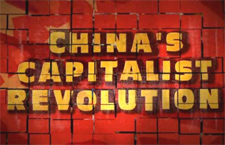 by James E. Miller –
by James E. Miller –
In a recent National Public Radio report, the real story behind the monumental land reforms which transformed the communist dystopia of China into a productive powerhouse was revealed.
In 1978, the farmers in a small Chinese village called Xiaogang gathered in a mud hut to sign a secret contract. They thought it might get them executed. Instead, it wound up transforming China’s economy in ways that are still reverberating today.
The contract was so risky – and such a big deal – because it was created at the height of communism in China. Everyone worked on the village’s collective farm; there was no personal property.
In Xiaogang there was never enough food, and the farmers often had to go to other villages to beg. Their children were going hungry. They were desperate. So, in the winter of 1978, after another terrible harvest, they came up with an idea: Rather than farm as a collective, each family would get to farm its own plot of land. If a family grew a lot of food, that family could keep some of the harvest.
This secret meeting, though innocuous to anyone accustomed to the benefits of private property, was dangerous in the then-wholly communist country. Most importantly, the agreement was hashed out with a document that goes hand-in-hand with private property: a contract. With a formal contract established and plots of land assigned to each family, the incentive was now in place in order for those farmers wishing to improve their own standard of living to do so by virtue of their own labor. While a certain portion of food still had to be given over to the collective, surplus quantities could be kept for private consumption.
And with that, the tragedy of commons mentality vanquished, and starvation ceased to be an issue. The simple rule of “keep what you make” had transformed the barren economy overnight. The hallmarks of capitalism which brought hundreds of years of increasingly material prosperity to the West were ironically established in a hut that lacked both plumbing and electricity. The results were immediate, as that year’s harvest was bigger than the last five years’ harvests combined. According to one farmer, “we all secretly competed — everyone wanted to produce more than the next person.”
As a man obtain the means of production — be it factory equipment, the contractual pledges of workers, land, etc. — he becomes both an entrepreneur and speculator. If he has any interest at all in maintaining the value of his assets, he will use them efficiently and judiciously to maximize their output.
In collectives, however, the mindset is quite different. Man loses his right to the sweat of his brow. He therefore loses any incentive to produce beyond a certain threshold, as he can no longer enjoy the excess of his labors. The mindset envelops the whole community, as performing the least amount of work necessary and living off the labor of others becomes commonplace.
This communal syndicalism is in fact what nearly brought an early end to the American experiment. When European settlers first arrived at the colony of Plymouth, they established a communist-like agrarian economy, where all harvested food was kept at a common storehouse for members of the community to enjoy at their pleasure. And much like China, rampant starvation forced a change in practice. After two years, privatized farming was adopted, which in turn lead to an abundance of food production and the very first Thanksgiving.
The message here is crystal clear: private ownership necessitates prudence. If there is a choice between hard work or less work, and the subsequent amount of consumption enjoyed by either remains the same, man tends toward the latter. Risk and investment aren’t considered in an environment where high time preferences (consumption rates higher than saving rates) are necessary for survival. Without capital investment, economies don’t progress above a level of minimal subsistence. Increases in productive capacity, which can occur only by tapping already saved capital, cease to occur. It’s a deadly and impoverishing cycle.
Early American colonists learned this lesson well over two centuries ago. The government of China adopted the reforms necessary for enrichment only a few decades ago after holding Xiaogang as a model for success. With hundreds of millions rising above poverty since 1978, the country ranks among the world’s leading economies. Sure, things are far from perfect in the once-communist giant, but China could easily become the economic phenomenon of the 21st century if the government further eases its overbearing strangulation on the private economy. And the same holds true for the U.S. and its behemoth of a Federal Register.
HT: American Thinker (article originally published on Jan. 29, 2012)
